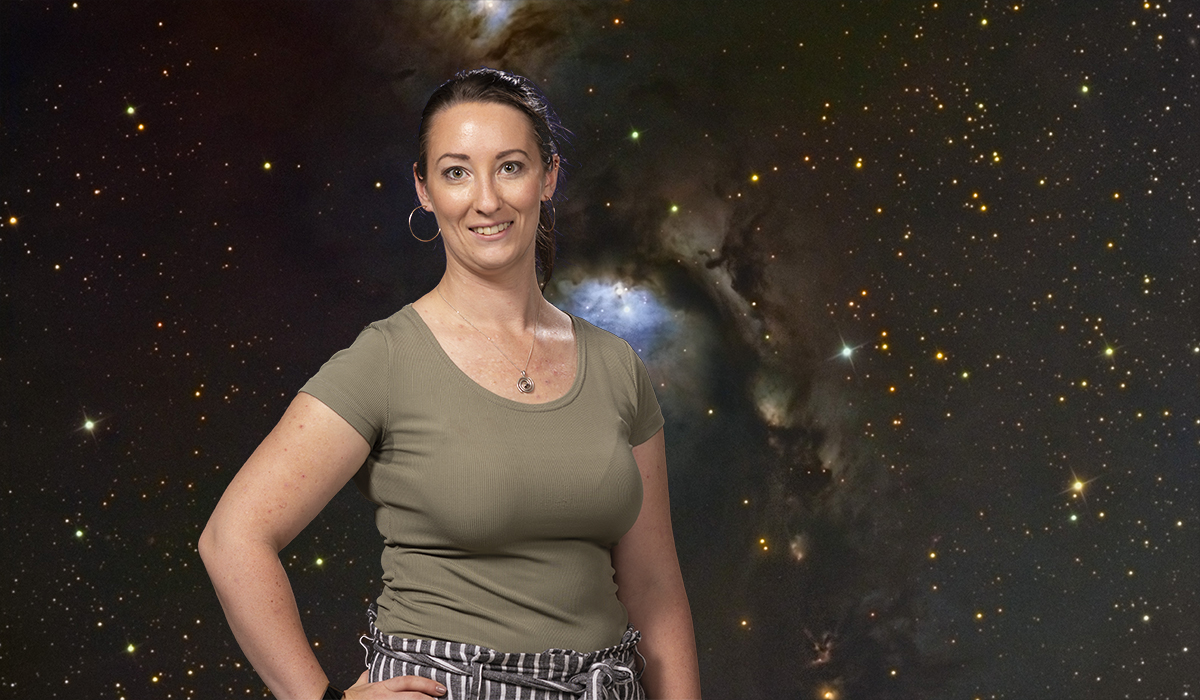Ask an expert: What’s an astrophysicist?
A certain reality TV show has opened astrophysics up to a new audience. So, what exactly is it?
A certain reality TV show has opened astrophysics up to a new audience. So, what exactly is it?

A certain reality TV show has opened astrophysics up to a new audience. So, what exactly is it?
We asked Dr Fiona Panther what it takes to be an astrophysicist and now we’d like to give them all a rose.
What is an astrophysicist?
An astrophysicist is a scientist who studies the physics of things beyond the Earth. This can be anything from the Sun, Moon and planets in our Solar System; to exploding stars, distant galaxies, and even how the whole universe began. Astrophysicists might use observations to do their work, or they may make calculations or computer simulations of things that happen out in space to understand our universe better.
Why did you choose this field of science?
I chose to be an astrophysicist because it meant I could explore all of the different aspects of physics I find exciting: for example, understanding how new chemical elements are made, and how and why some stars explode at the end of their lives. Astrophysics also gave me the opportunity to learn lots of skills that I could apply to a job outside of the academic world, like analysing complicated data, and how to communicate information to others in a fun and interesting way. I was also inspired by Carl Sagan’s TV series and book Cosmos, which is still on my desk at work today.
What’s the best thing about being an astrophysicist?
I feel like I get to learn something new, or master a new skill, every day! I also get to talk to and work with a lot of interesting people – I love hearing everyone’s different ideas about our universe. However, one of my favourite things is being able to use a telescope: It’s a real thrill to be responsible for driving a complex machine that weighs several tons, to catch a glimpse of a distant galaxy or a dying star. The light we see from these objects has travelled for millions of years to reach the telescope, and we get to witness it.
What are some of the challenges of your job?
While constantly learning something new is exciting, it can also be really challenging. New research is published daily, and sometimes information comes in so quickly it’s hard to decide what to prioritise. And although we’re always learning new things, astrophysics also requires a lot of patience - it can take months to find out if you get the opportunity to use a telescope or observatory, and it can take months for a simulation to run! Because so many things in astronomy take a lot of time, we are often working on multiple projects at once, so you have to be good at time management. This gets especially complicated when you are working with people across multiple time zones, which I do a lot.
Describe a typical work day.
Most days are very much like a 9-5 job (although I usually work from more like 8-4). I will come in and check my emails - my collaborators are in Europe and America so they will often send me things during the night here in Australia. Based on my emails I then plan out my day. Some tasks I may have to do are: write a research paper, or review one for a colleague; or write some computer code to visualise data or information from a simulation. I usually do a lot of calculations on paper as well - not everything needs a complicated computer simulation! Some parts of my job are seasonal: there are times we have to spend a lot of time writing a ’telescope proposal’ - this is a request to see if we can use a telescope to look at something in the sky, and getting the time to use the telescope is very competitive and proposal deadlines only come around once or twice a year, so these can take up a week or more of my time. I also get to teach students - so I may spend some of my day reviewing tutorial exercises or marking lab work. I also set aside time to talk to my colleagues about anything I may be stuck on, or to see if I can help them with their work. We often discuss what we are working on to see the different perspectives others may have on the work to improve it.
Are there any annoying astrophysicist stereotypes you’d like to dispel?
In science in general, there is a stereotype that scientists tend to work alone in an office or lab, and that we are all lone geniuses with brilliant ideas. However, most astrophysicists spend a lot of their time talking to and writing to their colleagues for advice, or to discuss an idea. When you see a research paper, you don’t see the hundreds of hours of conversations that went into it. And in terms of astrophysics: most astrophysicists don’t spend a lot of time using a telescope. Even for astrophysicists who do use observations, the majority of the time is turning the raw data into something useful - the majority of telescope instruments today don’t produce nice pictures that are shown in the media. The work done by astrophysicists turns tables of numbers into these pictures!
You are invited to join UNSW Canberra's Stars, Astronomers Dr Fiona Panther and Dr Simon Murphy for the public observing night A Night With The Stars!
On the night, attendees will be treated to short talks with our star researchers followed by a star gazing 'tour of the universe' assisted by the Canberra Astronomical Society.
There will be activities for all ages, UNSW Canberra experts on hand to answer all of your astronomy related questions and more!
Register here: http://bit.ly/2KkpWV8